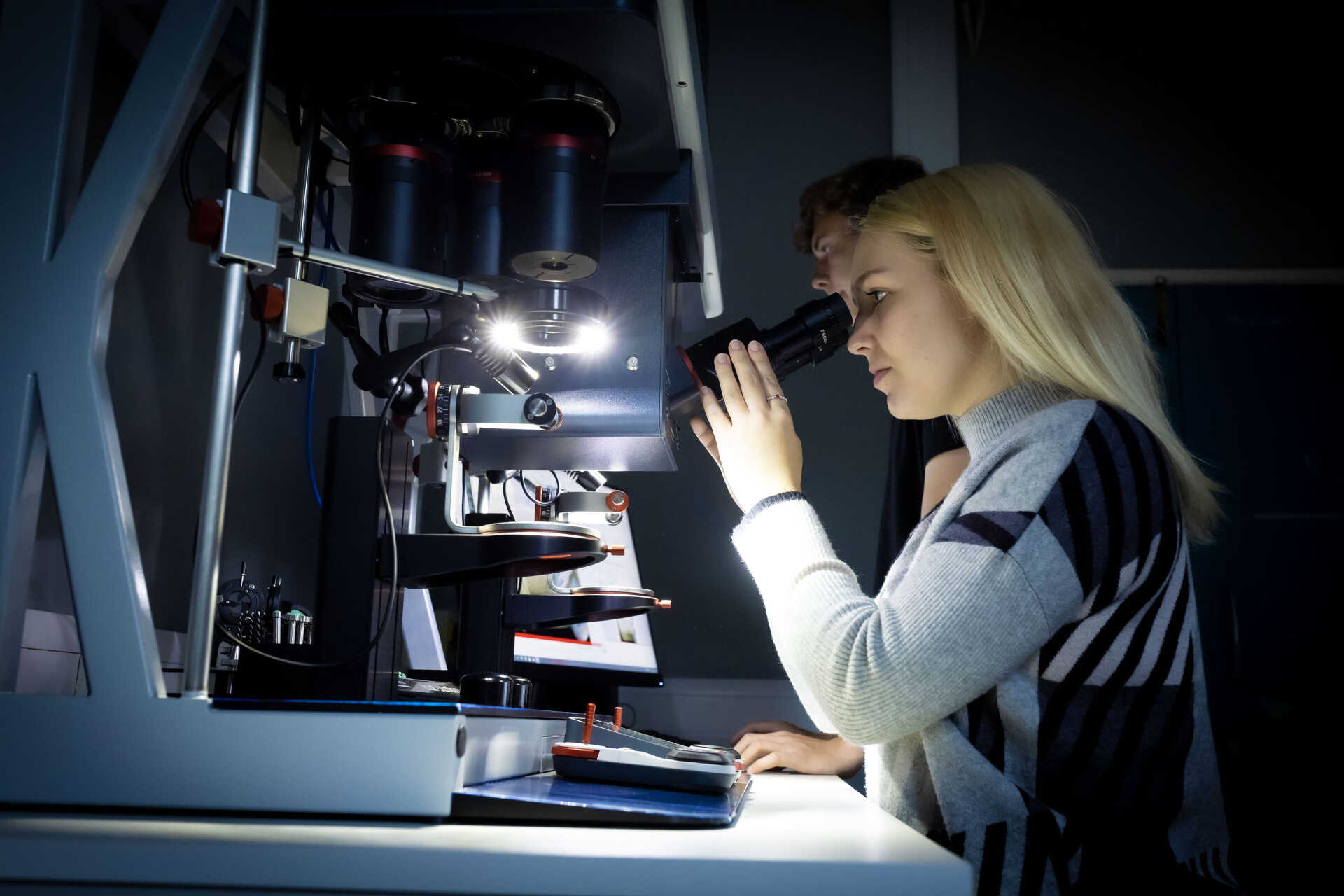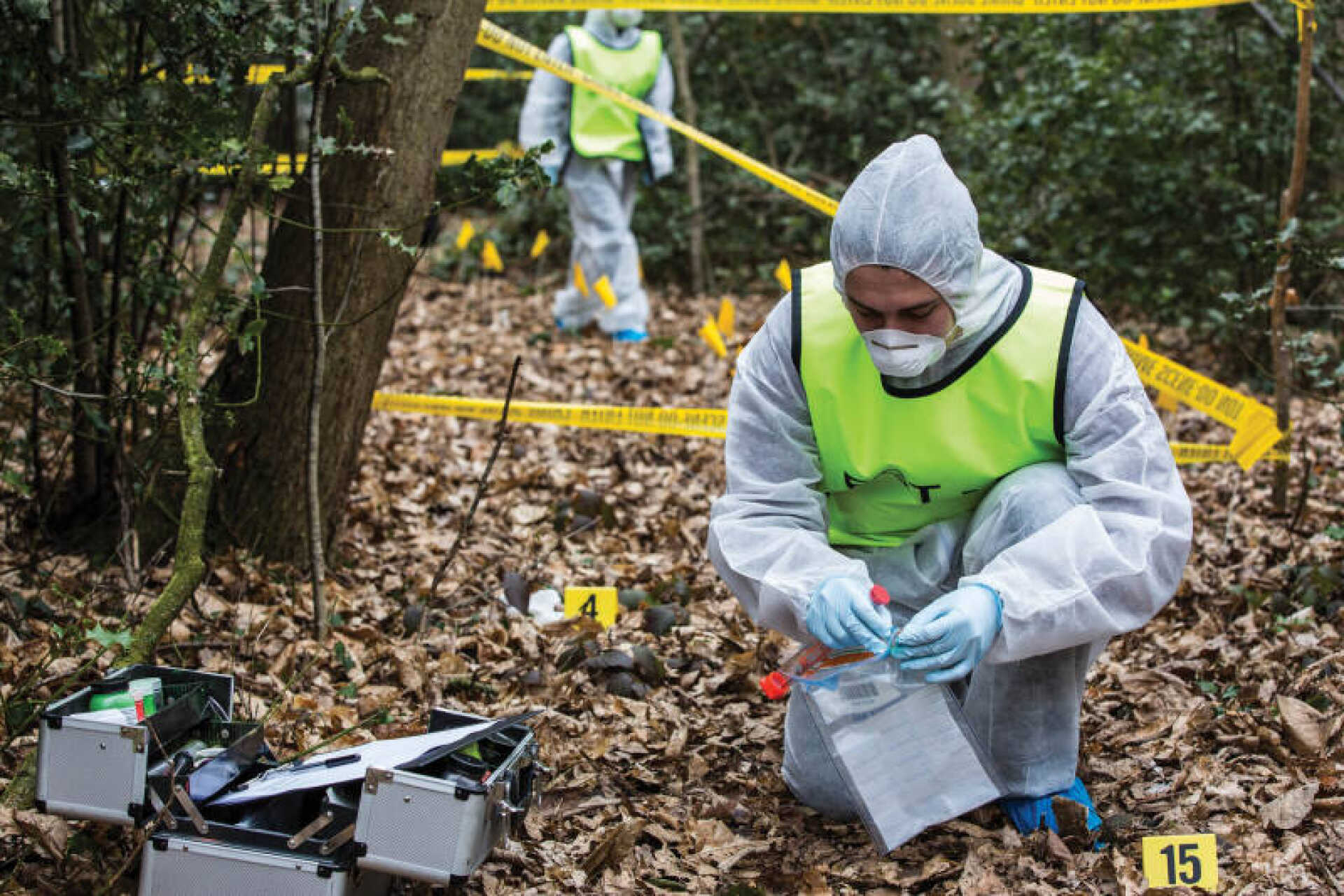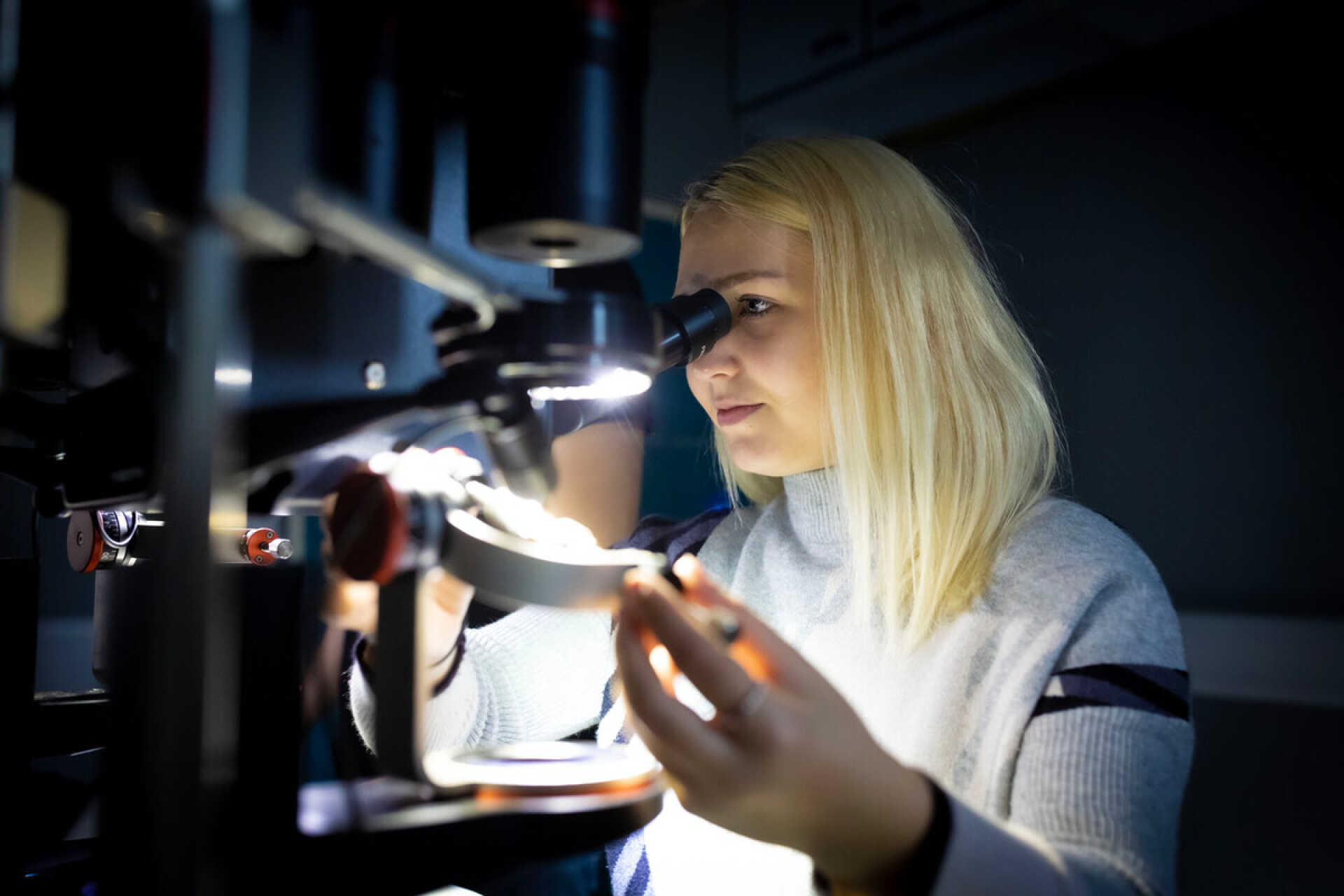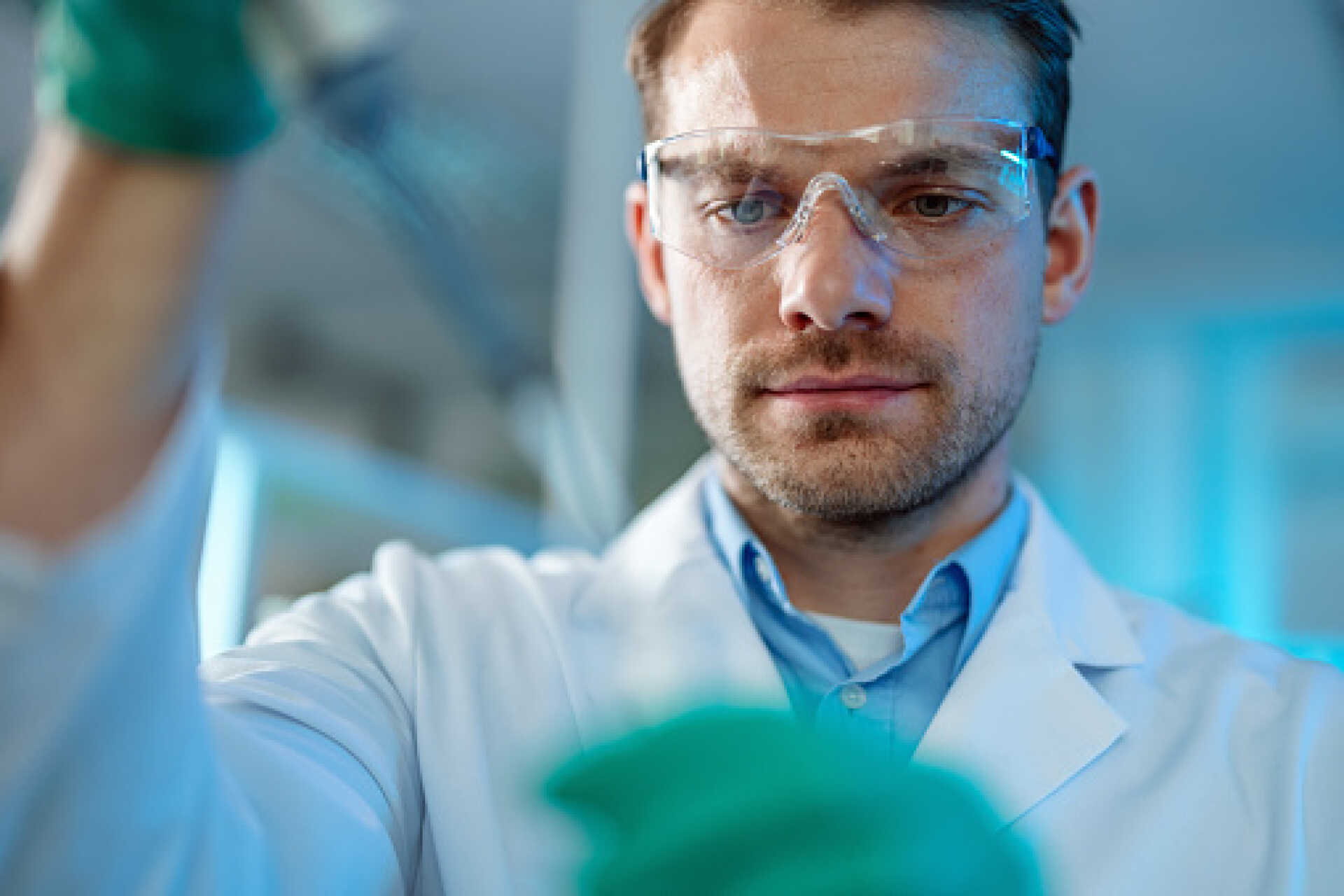Forensic Science
with a Foundation Year
Unlock the secrets of crime-solving and gain the skills for a rewarding career.

Unlock the secrets of crime-solving and gain the skills for a rewarding career.
Do you want to understand the science behind crime scene investigation, develop your laboratory skills and learn how to deliver expert witness testimony? Then choose our top-ranked Forensic Science degree.
This programme is designed for students who do not meet the requirements for direct entry to Stage 1 of our degree courses, and is an excellent conversion course for applicants who have shown academic ability in non-science subjects.
You'll graduate with in-depth knowledge of the theory behind the science. Much of your learning will be gained through simulated crime scenes, court cases and major incident exercises that unfold in real time in our outstanding laboratories. You’ll also discover how you can apply your skills to the field of archaeology and within the food and pharmaceutical industries.
This course is fully accredited by The Chartered Society of Forensic Science.

Your Forensic Science degree opens the door to lots of exciting careers; taking a Year in Industry helps you discover some of those options.
We're ranked 2nd in The Complete University Guide 2025.

Forensic Science student Luke Ryde has spent a lifetime planning his career path, discover why Kent was part of his plan.
Academic advisers and support staff are on hand to help with course and life queries; careers advisers to help you get where you want to go.

You'll use industry-standard equipment from the start of your degree.
Our typical offer levels are listed below and include indicative contextual offers. If you hold alternative qualifications just get in touch and we'll be glad to discuss these with you.
For those with a relevant science qualification our standard offer is CDD with one of these to be a Science subject, for those without a relevant science qualification our standard offer is BB, OR CCC including at least two subjects from the following areas: humanities, computing, art and design, English language or literature.
A typical offer would be MMP in Applied Science, Biomedical Science, Medical Science, Forensic and Criminal Investigation, Sport or Sports Coaching. All other subjects are considered on a case by case basis.
80 tariff points - typically H5, H4, H4 including HL Science Subject, Sport, Psychology or Maths at 4 or SL Science Subject, Sport, Psychology or Maths at 6.
N/A
Pass overall in Science with C or more in the core components.
The University welcomes applications from Access to Higher Education Diploma candidates for consideration. A typical offer would be to obtain Access to HE Diploma with 45 level 3 credits, including at least 6 at Distinction, 18 at Merit and 21 at Pass. This will then be reviewed by the School.
The following modules are what students typically study, but this may change year to year in response to new developments and innovations.
Since the dawn of time, humans have explored the natural world that surrounds us. Questions like, “What is life?” and “How did it all begin?” are essential because they intersect with virtually every aspect of human thought and activity, from the search for knowledge and meaning to the practical implications for science, ethics, and society.
The foundations of biological and chemical sciences are built on a set of fundamental principles and concepts that underpin the structure, behaviour, and interactions of matter and life. These foundations are vital for understanding the complexity of living organisms and the chemical processes that sustain them.
In this module you’ll begin an exciting journey into these scientific principles, starting from the structure of simple atoms and molecules to the incredible complexity of the human genome. You’ll investigate the building blocks of matter and examine how atoms form complex molecules, which ultimately give rise to living organisms.
Experiments are the building blocks of scientific enquiry, and in our Scientific Methods and Data Handling module, you will ignite your curiosity while gathering critical practical experience, skills and confidence in conducting scientific experiments.
You will test hypotheses with a series of engaging laboratory classes that investigate the science that surrounds us. You will analyse your own experimental data, develop your numeracy and data handling skills and use appropriate software to draw meaningful conclusions.
By blending theoretical understanding with practical laboratory investigations within natural science disciplines, you’ll be equipped with the tools necessary to progress in scientific inquiry and analysis. By the end of the module, you’ll have the competence and confidence in your academic abilities to operate effectively in a professional scientific context.
How and why are molecules fundamental to human life? What reactions take place in the cells of every organism to make them work? In this module, you’ll continue your journey into the foundations of scientific theory and method and find answers to questions like these.
You will learn the essential proteins and enzymes that exist in everyday life, the metabolic processes that allow us to create energy, and some of the chemistry that underpins these processes such as equilibria, acids and bases. Through engaging problem-solving exercises and interactive, thought-provoking lectures, you will deepen your academic knowledge in these areas, and explore the factors that drive chemical and biological processes.
After completing the module, you’ll be familiar with essential scientific principles. This will help you develop your interests further within your selected degree course and set you up for future success.
What is science, and how does research help advance scientific understanding? What are the steps to the scientific research process and what are the things to consider when conducting it? In this module, you’ll outline the essential steps associated with undertaking scientific research, and consider issues related to the experimental process and statistics.
You’ll undertake experiments that develop proficiency in collecting, analysing, and interpreting large data sets. You’ll also develop your ability to communicate with authority as a scientist and improve your skills in academic writing and referencing, information retrieval and analysis, and effective presentation.
By the end of this module, you’ll be able to think and operate professionally as a scientist, so you can explore the questions that matter to you and get answers. You’ll build on your scientific abilities and develop the transferable skills needed for both further academic study and future employability.
Why do chemical reactions occur? How do we analyse and understand the composition of substances? What techniques do we use to uncover the mysteries of chemical reactivity? In this module, you’ll begin a journey into the fundamentals of organic and inorganic chemistry, and learn to apply spectroscopic methods in analytical chemistry.
You’ll examine the different groups of the periodic table, uncovering the unique properties of each element and the fascinating chemistry exhibited by each distinct group. You’ll immerse yourself in the captivating world of organic chemistry and the different molecular classes, functional groups, and key reaction mechanisms that compose this discipline.
You’ll discover how spectroscopic and analytical techniques are used to identify, analyse, and quantify different substances. You’ll also come to understand how chemistry functions as the central natural science, connecting other fields of knowledge like physics, biosciences, sport sciences, and forensics.
Do you want to unlock the mysteries of life within us? Studying human biology and genetics provides insights into the workings of the human body, from fundamental cellular processes to complex physiological systems. Grounded in fundamental biological principles, you’ll explore the intricate functions of human tissues and organs, gaining insight into their roles in sustaining life.
You’ll examine the essential principles of genetic inheritance and the factors driving genetic variation, laying the groundwork for understanding the diversity of human traits. By understanding the processes that keep our organs working well, you’ll begin to understand how diseases emerge. By the end of the module, you’ll have developed a thorough and holistic understanding of the human body, health and disease onset, all of which help to shape out understanding of ourselves and our place in the world.
Sport science is a multi-faceted discipline, with important applications in performance and clinical settings. In the health sector, exercise is prescribed for general health and the management of many diseases, but how do the core natural sciences integrate with the study of sport and exercise science?
You will be introduced to fundamental principles and concepts, and examine these in real-life sport and exercise contexts and scenarios. You will learn to identify human anatomy and physiology, and understand how this relates to sport, exercise, rehabilitation and massage. You’ll learn how to assess amateur and elite sporting performance via performance testing and scientific analysis. You’ll also examine the psychology of sport and exercise and the biomechanics of human movement.
Once you complete the module, you’ll recognise the importance of physical activity and exercise for health, and understand how it can be applied to the whole population to enhance public health and wellbeing.
Embark on a fascinating journey into the heart of matter with our Fundamentals of Chemistry module, designed to ignite your curiosity and lay the foundations for your understanding of the chemical world. Delve into the fundamental principles that govern the behaviour of atoms and molecules, explore the mysteries of chemical reactions, and investigate the endless possibilities that chemistry offers in shaping our world. From understanding atomic structure to unraveling the complexities of bonding and reactivity, this course serves as a vital gateway, equipping you with indispensable knowledge essential for both forensic analysis and broader chemistry applications.
Why do we make molecules? Why does nature make molecules? What do these molecules do? What makes carbon so vital to life? What makes one molecule a medicine and another a poison? You'll start your journey in organic chemistry by answering some of these questions.
We'll introduce you to the basics of fundamental organic chemistry, looking at the structures of carbon-based molecules and how they can be put together in millions of different ways. We'll see how they bond with other elements to give complex compounds and how they can be made, synthetically and biologically. This module equips you with all you need to know about organic chemistry leading into your later studies in Chemistry or Forensic Science, laying the foundations for your degree and your career.
What is a crime scene? What happens at a crime scene? What is forensic science and what role does it play in legal proceedings? In this module, you'll explore how scientific techniques are utilised and applied to gathering and analysing evidence in criminal investigations.
Gain an insight into how a range of scientific disciplines can be used to uncover mysteries and bring justice to light. You'll consider numerous types of evidence that make up the 'toolkit' of a forensic scientist, and their evidential value. You'll develop an understanding of the role that forensic scientists play in crime scene investigation, the legal process, and crime scene management. Finally, you'll apply best practice to a series of fascinating case studies - gaining a core understanding of the importance of forensic science and the significance it holds in the administration and serving of justice.
What happens when someone pulls the trigger? How do bullets remain stable during flight? What makes one bullet more lethal than another?
In this module you'll look at how ammunition is constructed, how different classes of firearm function and develop skills in fundamental maths and physics that underpin basic bullet trajectories and impact phenomena. You'll develop a strong understanding in the fundamental principles upon which the field of ballistics relies and begin to apply this knowledge to forensic scenarios involving firearms to uncover truths and trace evidence to solve questions.
Inorganic and physical chemistry play a key role in underpinning broad areas of the forensic and analytical sciences, including identification of unknown substances, key biological processes and the chemical analysis of trace evidence. This module provides you with an understanding of the core range of inorganic and physical chemistry that underpins forensic analysis, including the states, stability and reactivity of matter and the patterns amongst the elements across the periodic table that are responsible for properties such as colour. You'll also be equipped with the key mathematical concepts necessary to understand and solve problems in these areas of chemistry and apply this to forensic science to uncover secrets, solve cases and answer questions.
Knowing how to approach a crime scene is imperative for all forensic practitioners to maintain integrity and ensure the delivery of justice. You'll will develop the toolkit of core practical skills that are employed to process an incident scene and prepare for crime scene investigation. Alongside this, you'll work through a range of exciting laboratory sessions to teach you the fundamental chemical techniques that a forensic scientist needs to excel in all areas of the profession, from chemical synthesis to forensic chemical analysis.
Through hands-on practical sessions, you'll learn the core techniques needed to collect evidence, and begin to develop the problem solving skills needed to identify, interpret and evaluate several evidence types, including firearms ammunition and fingermarks. Following this, you'll learn how to map out a crime scene, search a series of varied crime scenes and learn the best practices for documenting and acquiring photographs. This practical skill set is crucial for you making further progress in your degree, and later, your career.
Why is analytical chemistry important within the chemical and forensic industries? What approaches should we take when considering the chemical analysis of an unknown sample? Analytical chemistry is essential throughout the chemical and forensic world - covering not only how we design experiments to understand the composition of unknown samples, but also how we confirm and quantify results and assign a level of confidence to our findings. This module takes a pragmatic, application-driven approach to sample preparation, analysis, and data validation, providing key foundations for the modern analytical chemist - and the key skills needed for a number of careers in chemical and forensic industries.
Do you want to know more about the structure of DNA and how its structure has evolved to provide the building blocks of life? Have you wondered why different drugs behave in different ways inside our bodies? How do we create new treatments and therapies to tackle disease? This module introduces you to the key ideas and fundamental molecular components of biochemistry. You'll look at simple biomolecules and non-covalent interactions, building up to biological oligomers before you are introduced to key concepts in pharmacology and pharmacokinetics, illustrated with medicinal chemistry case studies. This application of theory into practice through examining case studies prepares you for a career where you can get hands-on and make a real difference.
As a forensic scientist, what would you do if someone comes across buried human remains? How do we collect evidence from a scene, document it and ensure we maintain a clear legal chain of custody? Why should we care about this? This module will develop your appreciation of a range of physical techniques applied to the collection of bulk and trace evidence materials in forensic science.
You'll look deeply into aspects of physical evidence, practical issues of item examination, legal process and general procedures associated with the collection and submission of a range of forensically-relevant materials. You'll also look at the processes that underpin the recovery of buried remains and how you being to analyse these to build a biological profile. This provides you with a broad understanding of scene and evidence processing to take forward into a future roles in practical forensic science.
What happens when the police seize computers during an investigation? How do we use cutting edge technologies to identify criminals? This module introduces you to a broad range of established, and emerging, computer based forensic methods that involve consideration of key digital forensic techniques, use of facial identification, and the construction of facial composites (eFITs) to aid criminal investigations.
Your awareness of modern digital image processing and photo forensics investigation methods will be developed during this module. You'll develop the ability to appreciate and engage with the current digital revolution and its appropriate application in policing and forensic investigation.
How do we investigate a shooting? What happens when someone gets shot? Why do different human tissues react differently under different impact conditions?
You'll be introduced to a wide range of experimental and theoretical processes that may be undertaken in aid of understanding what happened in a shooting incident. You'll also develop a deep understanding of the science that underpins high energy trauma and how scientists measure and interpret this to draw valid forensic conclusions in the specialist field of wound ballistics. The field of ballistics is used as a shining example of the importance of interdisciplinarity and the role this plays in modern forensic science.
The careful and considered collection of evidence from an incident scene along with the accurate and robust analysis of this evidence are the cornerstone of forensic science. But how do you decide upon the best ways to collect evidence, and which techniques to use, to assemble the best case with the evidence you have?
In this practical and laboratory based module, you'll develop advanced scene investigation and evidence collection skills before applying previously developed core chemical and forensic practical skills to broader and more real-life investigative scenarios. This involves consideration ballistic, digital and chemical evidence, using new and complementary analytical tools, techniques and instrumentation. You'll also gain valuable experience in concisely summarising and reporting multiple types of data in styles appropriate to different disciplines within forensic science.
Modern Chemistry and Forensic Science rely heavily on a suite of chromatographic and spectroscopic techniques. But which of these should we apply for our particular cutting-edge chemical research, or to obtain the specific, precise and robust forensic evidence we require?
This module builds upon your knowledge of fundamental concepts and methods to understand the specificity, advantages and limitations of these more advanced techniques, and explore approaches to best apply them across a broad range of applications. Using this knowledge, you'll strategically choose and expertly apply advanced analytical methods across a range of scenarios explored elsewhere within your course.
Beyond this course, you can apply these interdisciplinary skills and technologies to pioneering research and in support of impacting real world issues in fields including environmental chemistry, forensic trace analysis and pharmaceutical development and detection.
What properties of a material define its value as trace evidence? How can we use this understanding to shape our approach to collecting and analysing these evidence types?
Understanding trace evidence is of fundamental importance to Forensic Science, providing links between people and locations or objects. In this advanced module you will delve into the analytical techniques and chemical principles critical for examining trace materials. From fibres and hair to glass fragments and makeup, you'll uncover the stories hidden in the smallest samples. Through discussion of real-world case studies and studying cutting edge approaches to analysing complex and inconsistent samples, you'll build the expertise to enable you to interpret this vital evidence type.
What causes a fire to rage out of control? What makes an explosion so destructive? How do we gather and analyse evidence we normally rely upon from a scene that may have been compromised by a powerful blaze or destructive explosion?
This advanced module develops your understanding of the chemical and physical processes that drive fires and explosions. You'll learn how to identify accelerants, detonators and types of explosives, reconstruct fire scenes and develop insights as to the nature of fires and explosions, allowing you to formulate expert opinions based on your findings. You’ll also learn about how best to apply specialist analytical techniques for the analysis of fire and explosive evidence.
Forensic science and DNA have been inseparable topics for decades, but what role does DNA play in forensic science? You'll look at the structure of DNA and the powerful techniques we use to analyse this important evidence type within a forensic context. You'll gain a critical understanding of practical considerations in genetic analysis, the challenges associated with results interpretation and how best to report on complex samples. You'll not only gain mastery of DNA analysis techniques but also investigate profound insights into their application in the captivating field of forensic science, all while exploring the intriguing ethical quandaries connected with deciphering genetic information.
How can we apply our forensic science knowledge and problem solving techniques to original forensic challenges? How can we innovate within forensic science to build on the knowledge base within our scientific and global communities?
You'll undertake a comprehensive group research project, selected from a range of forensic science disciplines. You'll gain skills in conducting and directing scientific research, data analysis and interpretation, problem solving and communication of results, culminating in the writing of your dissertation. This isn't just your chance to hone you skills and develop as a forensic scientist, your dissertation itself is a real piece of scientific research you can use to demonstrate your knowledge and skills to employers following graduation.
Why is it important to understand the influence of bias within forensic science? What are the expected professional standard for a practicing forensic scientists? How do forensic laboratories adhere to the strict standards the legal system expects of them? What is it like to give evidence in a court of law?
This module illustrates a range of contemporary topics in forensic science that underpin professional practice for those students wishing to enter the forensic science profession. The module content draws upon guidance published by the UK Forensic Science Regulator, UKAS, ENFSI, CSFS as well as academic and professional commentary, with a particular emphasise on evaluative reporting, case assessment and interpretation (CAI), quality standards, ethics in forensic science and bias.
You will be provided training in writing expert witness court reports before undergoing a mock courtroom exercise during which you will deliver expert testimony in a courtroom environment, developing essential skills for future case reporting forensic scientists.
This course teaches core scientific principles and applied forensic science disciplines through insightful lectures, as well as laboratory classes, project work and problem-solving seminars.
Assessment is by a combination of written examinations, continuous assessment and other assignments. Coursework assessments include incident analysis, evidence preservation, presentation skills and expert witness testimony.
For a student studying full time, each academic year of the programme will comprise 1200 learning hours which include both direct contact hours and private study hours. The precise breakdown of hours will be subject dependent and will vary according to modules.
Methods of assessment will vary according to subject specialism and individual modules.
Please refer to the individual module details under Course Structure.
For course aims and learning outcomes please see the course specification.
Forensic scientists are in demand in lots of areas. In addition to working with the police and in the criminal justice system, forensic skills are also sought after in the food and pharmaceutical industries and can be applied within archaeology. Our graduates have gone on to work for companies such as:
You'll also develop key transferable skills including: the ability to work independently or as part of a team; to analyse and problem solve; to conduct research and communicate your findings.

*The Government announced on 4 November 2024 that tuition fees in England for Home students will increase to £9,535 from £9,250 for the academic year 2025/26. This increase requires Parliamentary approval, which is expected to be given in early/mid 2025.
Tuition fees may be increased in the second and subsequent years of your course. Detailed information on possible future increases in tuition fees is contained in the Tuition Fees Increase Policy.
The University will assess your fee status as part of the application process. If you are uncertain about your fee status you may wish to seek advice from UKCISA before applying.
For details of when and how to pay fees and charges, please see our Student Finance Guide.
You will require regular access to a desktop computer/laptop with an internet connection to use the University of Kent’s online resources and systems. Please see information about the minimum computer requirements for study.
Find out more about accommodation and living costs, plus general additional costs that you may pay when studying at Kent.
Kent offers generous financial support schemes to assist eligible undergraduate students during their studies. See our funding page for more details.

We have a range of subject-specific awards and scholarships for academic, sporting and musical achievement.
We welcome applications from students all around the world with a wide range of international qualifications.

Student Life

Powered by progress
Kent has climbed 12 places to reach the top 40 in The Times Good University Guide 2025.
Kent Sport
Kent has risen 11 places in THE’s REF 2021 ranking, confirming us as a leading research university.

An unmissable part of your student experience.